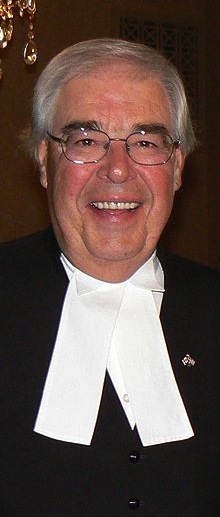Civilization as we know it in Alberta has ended.
Ken Kowalski, 66, is stepping down. The Speaker of the Alberta Legislature and its longest-serving MLA — “the dean of the Legislature,” in Press Gallery-speak — made the announcement yesterday morning in a news release that looked as if he’d typed it up himself late at night on his home computer.
“As I enter my 33rd year as an elected person, I have decided that I need to take back my life and find a private life,” Kowalski said in his unexpected announcement. “As a result, I am withdrawing my candidacy for the PC Association of Barrhead-Morinville-Westlock and will not be a candidate in the next provincial election in Alberta.”
When he goes, of course, Kowalski will pocket a nice little payout of more than $1.3 million dollars.
He joins a rapidly growing list of Progressive Conservative MLAs — many of them cabinet veterans and former party movers and shakers — who are streaming for the exits.
On the list so far: former premier Ed Stelmach, 60, the man who started it all when he announced his intention to resign in January 2011; Iris Evans, who is just days away from her 70th birthday and served as health minister under premier Ralph Klein; Ron Liepert, 62, the bull in Alberta’s political china shop, health minister under Stelmach and now finance minister; Lloyd Snelgrove, 55, president of Treasury Board under Stelmach.
Lesser lights include former energy minister Mel Knight, 67; former children’s minister Janis Tarchuk, 56; Richard Marz, 67; Barry McFarland, 63; and Ken Allred, who will be 71 in a couple of weeks. By the time this is posted, this list will probably have grown: at any rate, expect neo-Con grandee Freddy-Lee “Ted” Morton, 62, once the finance minister and now the mighty minister of energy, and Gene Zwozdesky, 63, another former health minister, to join the list before long.
There are two reasons why generational change is happening so dramatically right now in the Alberta Progressive Conservative Party:
The first: Premier Alison Redford, 46, has decreed that it will be so.
Do not doubt this. Like Kowalski, most of the departing old-timers are mouthing platitudes about how it’s time for them to recover their private lives, pursue their hobbies, travel or whatever. As Allred, the MLA for St. Albert, gamely told a local bi-weekly newspaper, Premier Redford had nothing to do with it: “I have got other things I want to do in life.”
But the reality is that Redford and her political aides and allies have made it abundantly clear behind the closed doors of the caucus room that the time has come for the relics of the PC caucus to move on. This is a calculated political decision to renew the Alberta Tory Party and make it acceptable to a new generation of voters — exactly what Redford was elected by party members to do.
It is said here that many of the retiring MLAs mentioned above would have preferred to hang onto their seats for another four years, and had tried to cut deals to do just that with candidate Gary Mar, who was the front-runner in the Conservative leadership campaign last summer and fall. Their fates were decided as surely as Mar’s on the night of Oct. 2 when party voters spoke and said “Alison Redford.”
The second reason: The need to depart swiftly has been clearly tied to the financial well-being of veteran caucus members.
They’ve been warned: They can have their huge payouts if they go now, but if they linger, the big bucks may not be there when it’s time to retire. What would you do if you had to choose between $1.3 million to go immediately, or a pig in a poke and maybe a quarter of that after three or four years on the backbenches? It’s not quite a hanging in a fortnight, but nevertheless it would concentrate an MLA’s mind wonderfully!
Alberta MLAs’ generous “transition allowances” — brought in by Klein as a way to eat his cake and have it too after eliminating similarly generous Legislative pensions during his mid-1990s privatization and cutbacks spree — pays three months’ salary for every year of service based on a member’s three highest-paid years in office.
In addition to Kowalski’s $1.3-million-plus payout, according to the Canadian Taxpayers Federation, Stelmach will receive a transition allowance of a little over $1 million, and most of the rest the following: McFarland, $709,500; Evans, $698,700; Tarchuk, $645,400; Marz, $544,200; Snelgrove, $513,000; Knight; $513,000; and Liepert, $348,700. And this is not to mention their remaining pensionable earnings.
Whether or not Redford’s strategy will bring success remains to be seen, but it seems a better bet than leaving a generation of tired old Tory warhorses still in harness while voters grow increasingly antsy and began to think seriously of voting for alternatives like the Wildrose Party, led by the 40-year-old Danielle Smith.
It doesn’t hurt that the Conservative Party is well placed as the province’s Natural Governing Party to attract a new generation of candidates likely to both be loyal to Redford and to appeal to Alberta’s habitually conservative voters.
Meanwhile, pandemonium must now surely reign in Kowalski’s Barrhead-Morinville-Westlock electoral district, a large rural riding northwest of Edmonton.
The best-laid plans of Wildrose candidate Link Byfield — rather like those of his leader when Stelmach last year announced his plan to quit — have been blown to smithereens. The money he spent taking pokes at Kowalski in the local weekly newspaper has gone swooshing down the drain.
There will likely be a dozen candidates for the nomination the Speaker is giving up, many of them credible people who believe Kowalski’s old job will be a sinecure. Look for a packed nomination meeting attended by literally hundreds of community members.
This being Alberta, not only has everything changed, but everything remains exactly the same!
This post also appears on David Climenhaga’s blog, Alberta Diary.



